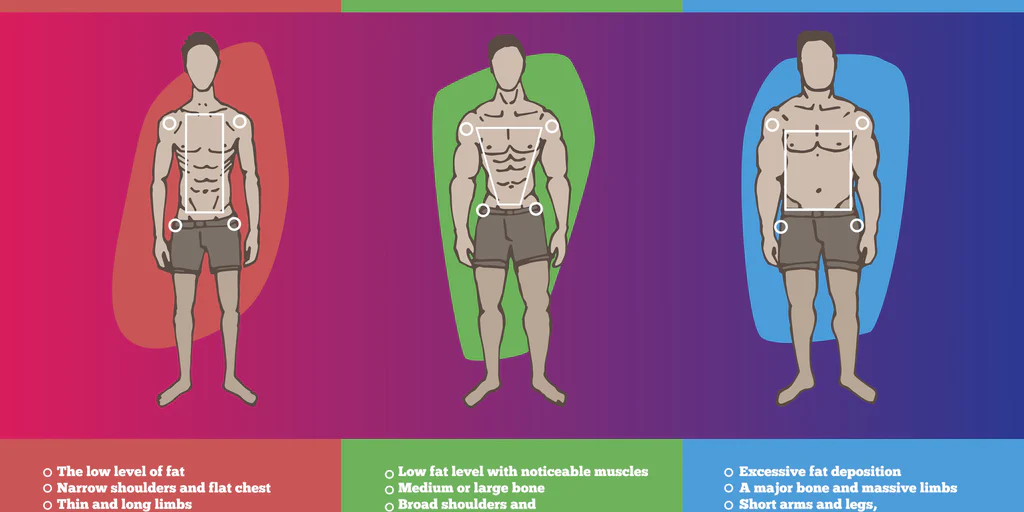What is an ectomorph?
In the world of body types and somatotypes, the term “ectomorph” often surfaces, referring to individuals who have a distinctive physique and metabolism. Ectomorphs are commonly known as “hardgainers” due to their struggle to gain weight and muscle mass.
In this article, we will delve into the world of ectomorphs, exploring their defining characteristics, genetic traits, dietary needs, and fitness challenges. By understanding the unique features of ectomorphs, we can pave the way for better fitness approaches and tailored strategies to help them achieve their goals effectively.
But what is an ectomorph?
An ectomorph is one of the three primary somatotypes used to categorise individuals based on their body composition and physical characteristics. The three main somatotypes are ectomorphs, mesomorphs, and endomorphs. Ectomorphs generally have a lean and slender build, characterised by narrow shoulders, slim hips, and a fast metabolism. These individuals often struggle to gain weight, including both muscle mass and body fat.
Ectomorph traits
Ectomorphs typically have a long, lean body structure, with little body fat and a relatively low amount of muscle mass. Their limbs are often elongated, which can give them a “lanky” appearance.
Perhaps the most well-known trait of ectomorphs is their difficulty in gaining weight. Despite consuming ample calories, they may find it challenging to put on muscle mass and body fat. The reason for this is that many ectomorphs boast a high metabolic rate, which means they burn calories quickly. While this can be advantageous in terms of staying lean, it can make it challenging to maintain or gain weight.
Alongside this, ectomorphs tend to have a delicate bone structure with lower bone density than mesomorphs and endomorphs, making them more susceptible to fractures and injuries.

Genetic predisposition
The somatotype classification is not an exact science, but rather a general categorisation based on body types. Genetics plays a significant role in determining an individual’s somatotype. Ectomorphs may have a family history of slim builds and naturally fast metabolisms. The characteristics of ectomorphs are thought to be influenced by genetic factors and hormonal balance.
How to gain weight as an ectomorph
Many ectomorphs struggle to gain weight for many of the reasons above. As such, when trying to gain weight as an ectomorph there are a few key considerations to take into account;
As with any weight gain diet, ectomorphs must consume more calories than they burn to gain weight. This means focusing on calorie-dense foods, (and often focussing on calorie volume rather than quality) to actually get into a surplus vs expenditure levels.
Instead of three large meals, ectomorphs may benefit from eating smaller, more frequent meals throughout the day to ensure a steady supply of nutrients and get the overall calorie volume in. I, myself am an ectomorph and consume 5-6 meals per day with a BMR of 3300 cals maintenance. On a bulk, this can exceed well over 5,000 calories per day spread through 6 meals and shakes.
Protein is essential for muscle repair and growth. Ectomorphs should include protein-rich foods within their diet with a focus on protein intake as the primary tracked macronutrient at a minimum of 1g per lb of bodyweight to be consumed daily.
Alongside these dietary tips, an ectomorph may often look to decrease expenditure by removing cardio and reducing neat expenditure when trying to gain weight. (I can vouch for this although not good for the heart, it’s great for the gains).
In terms of training itself, focusing on resistance training is advisable, steering clear of elongated sessions and focussing on the effectiveness of training through methodologies such as progressive overload to stimulate muscular growth.
Conclusion
Being an ectomorph is great in many ways, but it does come with it’s challenges. Whilst you may find it harder to gain tissue, you’ll always be naturally leaner than other body types, but you can still build an impressive physique nonetheless.
Just focus on calories in vs calories out, good protein sources and resistance training and you’ll be able to gain weight. If you’re not gaining, you’re not eating enough!!






